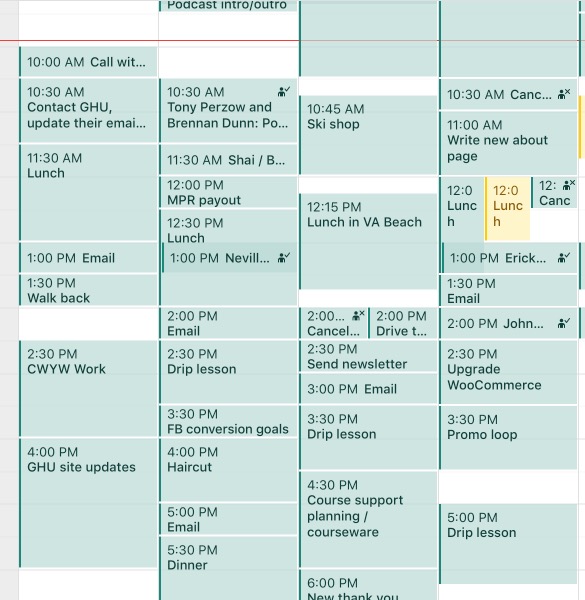I don’t know about you, but I’m always full of hope and optimism at the end of the year.
This is going to be the year I finally make going to the gym a routine.
This is the year I finally write that new book.
This is the year I finally run my freelancing business like a proper business.
It’s all good and well to have lofty goals—after all, goals make the mundane day-to-day tasks more palatable.
But you can’t check “wrote a new book” off a to-do list. Rather, writing a book involves planning, outlining, index cards, sticky notes, writing drafts, getting drafts edited, rewriting drafts because the first version really sucked, and so on.
The same thing goes with your business.
If you want to make $100,000 next year and you made $50,000 this year, you’re going to need to reliably charge more (by offering a better product) or sell twice as many projects, build a solid foundation of clients on retainer, create and launch your own products, or any number of other options at your disposal.
But it can be a bit overwhelming.
What should you be doing next?
What’s the #1 thing you should be focused on right now?
I can’t answer that for you.
But I can give you a few recommendations on where to start. “Freelance lifehacks,” if you will 🙂
Own your availability
Want to get stuff done? Schedule it.
Here’s last week for me:

Ridiculous, right?
But the empty bits would have been filled with something… Goofing off on Facebook, aimlessly staring at my screen, or trying to figure out what the heck to do next.
By scheduling my days so granularly, I’m able to minimize day-to-day decision-making. And by eliminating vacuums, which beg to be filled, I’m making time for things that matter to me: daily walks, getting to the gym, attending lectures at the local space center.
The sort of things I’ve always wanted to prioritize but life always found a way of keeping at bay.
Experiment with waking up early and scheduling the next few days in advance. Robotically work through your day, and you’ll be amazed at just how much you’re able to get done.
Start creating SOPs
Standard Operating Procedures, or SOPs, admittedly don’t sound very sexy.
After all, who gets excited over processes?!?
But by having checklists in place for common tasks (invoicing, onboarding new clients, qualifying clients, …) you’ll not only make your job easier but you’ll also come off as much more professional to your clients.
Here’s the thing… if you fumble your way through the first meeting with a client or don’t have a methodical way of getting them from here-to-there, you’re going to come off as a high-risk amateur.
“Has this person ever done this before?”
You don’t want your clients thinking that. And if you don’t have processes in place that guide them through the entire process of working with you, they might.
Don’t worry about doing all of this in advance.
The next time you do one of these core tasks, just write down what you’re doing.
And each time you do the task again, work off your SOP and amend and improve as necessary. These should be fluid documents that describe and, in a way, make the work you do “franchise-able.”
Never work without a contract
Won a new project?
Great. Send your Master Services Agreement over and get it signed.
Your contract should include, at a minimum:
- A non-disclosure agreement
- Payment and invoice terms
- Ownership of intellectual property, and when/how your client assumes ownership
- A sensible non-compete clause
- If things go south, where litigation would take place
I include my Master Services Agreement and Statement of Work templates in Double Your Freelancing Rate: Complete.
Get some basic automation in place
While you’re building out your processes, try to think about what you can delegate to automation platforms like ConvertKit.
At a minimum, you should maintain a newsletter for your consulting business. That just requires sending out well-written broadcast emails of curated links or, ideally, your own articles to your audience once a month or so.
But you can expand on that and setup automation for a number of lead nurturing opportunities:
- Qualifying and prepping new project leads
- Following up with people you meet at events or conferences
- Onboarding new clients and getting them familiar with the way you work
- A post-project offboarding sequence that follows up with past clients and encourages them to hire you on retainer, refer you, or provide you with an in-depth case study
Experiment with positioning
Positioning is a scary and intimidating concept for many freelancers.
Ditching the generalist mantra in favor of focusing on solving a specific problem for a specific type of business is a daunting exercise (we dedicate a lot of time to this topic in The Blueprint.)
But here’s a little exercise you can try doing…
I got a request from a new project lead who needs some automation and marketing work for their SaaS product. I have my general consulting “sell sheet” webpage that I send to those who are interested in working with me, but I don’t yet have anything for the needs SaaS businesses have.
It’s too late for this prospect, but I’ll likely create brennandunn.com/saas that speaks directly to what SaaS businesses care about. I’ve worked with plenty of SaaS companies (I even ran one for a few years), but there’s nothing available right now that I can bounce back to someone who runs a SaaS to see if working with me would be a good fit.
And this prospect had to read between the lines of my consulting site to determine that I could help in the way he needed me to. (You don’t want to leave prospects with so much responsibility—that’s a surefire way to end up distancing people who could end up hiring you.)
Try creating a simple overview page that speaks to the needs and desires of a type of business that regularly comes your way. What needs do they have? What expensive problems are there to fix?
When you get another inquiry from a business that aligns with the positioning of that page, let them know that this is an area of focus for you and link them to that overview.
Trust me, your conversions and overall lead quality will go through the roof.
Read more
Want to write better? Read more.
I don’t consider myself a great writer—I can’t go a week without an armchair grammarian letting me know about some issue with the copy on my website.
But I’m an effective writer. People like my content and it helps a lot of people. And I think it’s because I spend a lot of time reading.
Some people only read non-fiction books because they feel like reading fiction is a waste of time. I disagree—I think we can learn just as much from a fictional story as the best business books.
Two of my friends maintain great reading lists. They’re my go-to, and I can’t recommend them enough:
- James Clear’s reading list (grouped by genre)
- Derek Siver’s reading list
Write more
Even if you don’t identify as an author, you are a writer because you’re a communicator and you probably do a lot of work within your inbox.
Being able to clearly and succinctly communicate using the written word is probably one of the best business skills you can possess.
You can take all the courses in the world on becoming a better writer, but nothing beats making writing daily a habit.
As a freelancer, what should you write?
- Blog articles that summarize the kinds of questions your clients and prospects bring to you
- Case studies showcasing the work you’ve done for your clients
- A weekly business journal
Identify how you want to live, and then work backward
We lost someone in the DYF community.
If you were a member of the Freelancers Guild or the DYF Academy (now The Blueprint), you know Jason Pelker. I don’t think a thread exists in the Guild that he didn’t contribute to.
We’re Facebook friends, and he was one of those people who’d pop up on my feed with a picture of him in some exotic location.

Jason lived.
He was always someplace new. I don’t think he ever thought, “I can’t afford to travel the world.” On the contrary, he figured out how to make his consulting business fit his life.
Jason suffered a fatal brain injury on Tuesday while snowboarding in Switzerland, traveling the world he loved so much. From the outpouring of grief and support that I’ve seen on his Facebook wall, no one doubts that Jason—like so few of us—truly lived.
You get one shot at life… don’t waste it.
Don’t suffer from mediocrity. Don’t suffer from self-limiting beliefs like “I can’t afford this” or “I can’t do this” or “this isn’t meant for people like me.”
As a freelancer, the world is literally your oyster.
If you want to travel and work, you can.
If you want to be the best dad or mom possible to your kids, you can.
Figure out first the life you want to live, and then work backward to determine how you’ll get there. You’re not going to magically end up there one day—it’s going to take you to get there. And no one else.